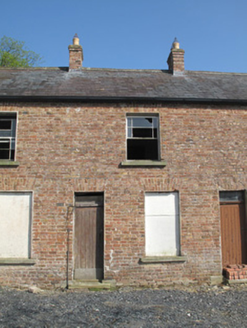Survey Data
Reg No
41400405
Rating
Regional
Categories of Special Interest
Architectural, Social
Original Use
Worker's house
Date
1875 - 1885
Coordinates
270462, 346715
Date Recorded
28/03/2012
Date Updated
--/--/--
Description
Terraced two-storey house, built c.1880, as one of terrace of three, with single-bay first floor and two-bay ground floor. Currently unoccupied (March 2012). Pitched slate roof with shared red brick chimneystack and clay chimneypots, replacement rainwater goods and clay ridge tiles. Red brick walls laid in English garden wall bond. Outline of outbuilding adjoining wall to rear (north-east) elevation. Gauged-brick square-headed window openings having render reveals, tooled limestone sills, and side-margined two-over-two pane timber sliding sash windows, blocked to ground floor to front (south-west) elevation. Gauged-brick square-headed door openings to front and rear, render reveal, timber battened door and overlight to front. Timber stairs and some fittings extant to interior.
Appraisal
This terrace of simple red brick houses adjoining the former post-office, shop and public house of the mill village of Mullan were built to accommodate the workers in the flax mill. This house retains much of its original form and character including some internal fittings, with timber sliding sash windows. Its asymmetrical facade is notable. Mullan is representative of the numerous mill villages which were constructed in Ulster throughout the eighteenth and nineteenth centuries. It was abandoned after the flax mill closed at the end of the latter century. In the twentieth century the mill returned to use first as Mullan Woollen Mills and then as Mullan Mills Shoe Company at which time these houses were reoccupied. Workers' houses were built as both a means to attract skilled workers to an area and as an added means of social control on the part of the employer, and buildings such as this example were key elements in the establishment of class relations in the nineteenth century. They still hold an important social and historical significance.

